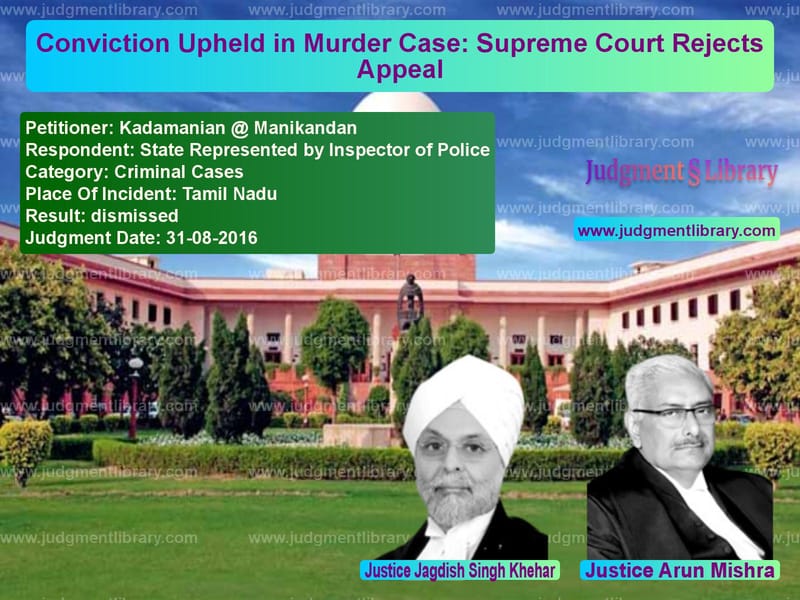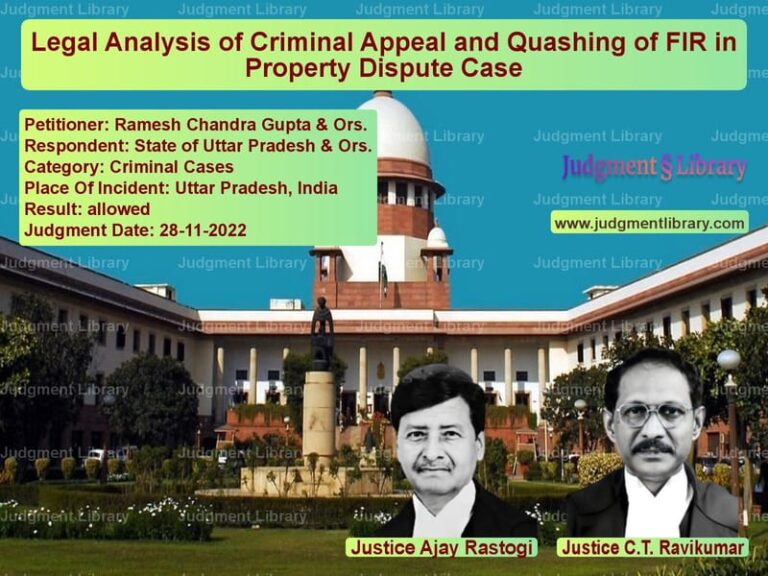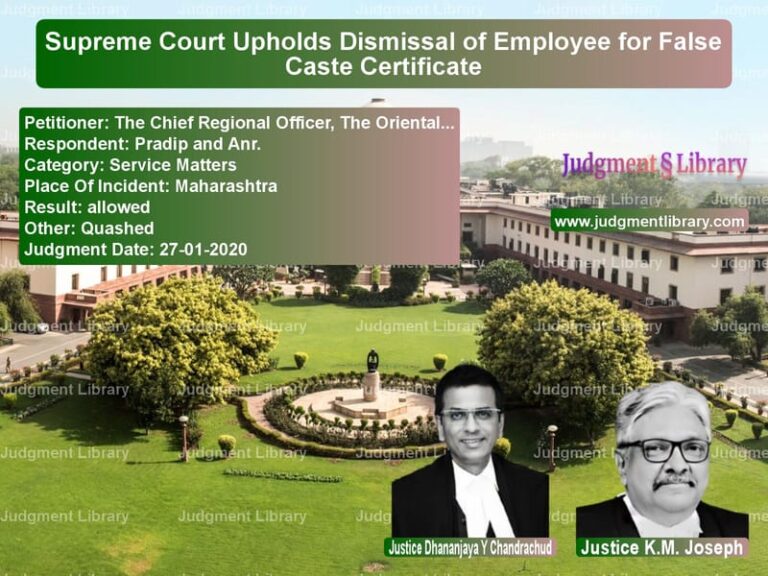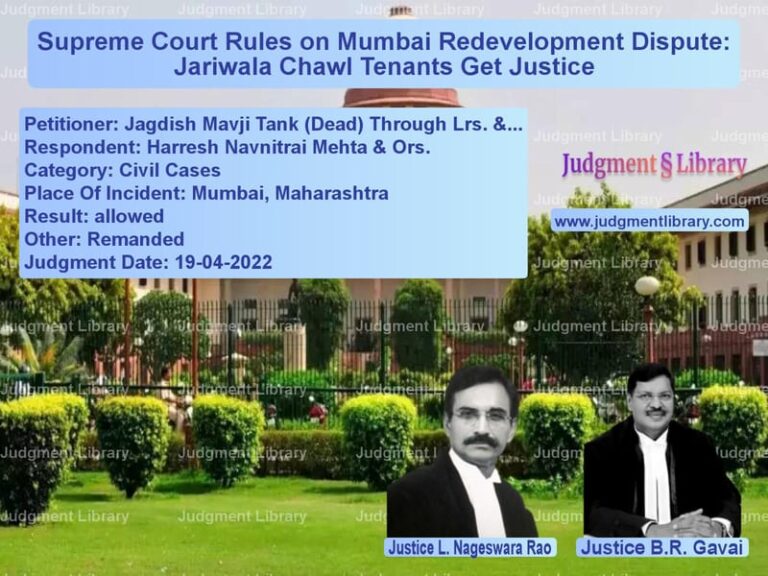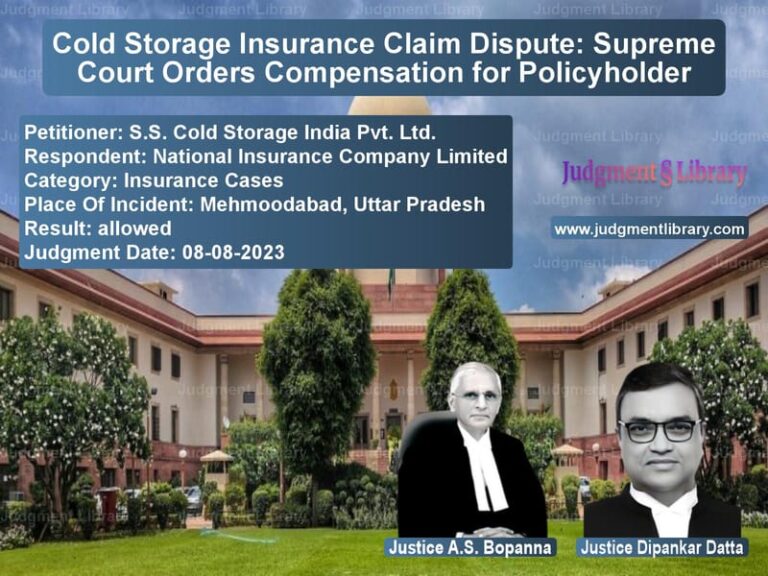Conviction Upheld in Murder Case: Supreme Court Rejects Appeal
The case of Kadamanian @ Manikandan vs. State Represented by Inspector of Police is a criminal appeal concerning a conviction for multiple offenses, including murder, sexual assault, and destruction of evidence. The Supreme Court of India examined whether the conviction of the appellant was based on valid and legally admissible evidence.
Background of the Case
The prosecution alleged that the appellant, along with a co-accused, committed the offenses under Sections 201, 302, 376, and 404 of the Indian Penal Code (IPC) against the victim, M. Jayalakshmi. She had gone missing on September 6, 2007, and a missing person report was filed by her father on September 7, 2007. Her body was later found on September 9, 2007.
The first breakthrough in the investigation occurred when the investigating officer, Arumugam (PW20), received information implicating the appellant. Subsequently, the appellant allegedly made an extra-judicial confession to the Village Administrative Officer, R.V. Alagurajan (PW12), which was considered a key piece of evidence in the case.
Legal Issues Before the Supreme Court
- Whether the extra-judicial confession made by the appellant was admissible and reliable.
- Whether the recovery of the victim’s nose-stud at the appellant’s instance could be considered strong evidence against him.
- Whether the appellant’s conviction was justified based on circumstantial evidence.
- Whether the acquittal of the co-accused warranted a similar relief for the appellant.
Arguments by the Appellant
The appellant, Kadamanian @ Manikandan, raised several defenses:
- The conviction was based solely on circumstantial evidence, with no direct eyewitness testimony linking him to the crime.
- The extra-judicial confession to PW12 was unreliable, as the appellant had no prior relationship with the witness, making it improbable that he would confess to him.
- The recovery of the victim’s nose-stud was fabricated, as the prosecution failed to establish how it remained intact despite claims of severe facial mutilation.
- The co-accused was acquitted based on the same evidence, and the same benefit should be extended to the appellant.
Arguments by the Respondent
The prosecution countered the appellant’s claims, arguing:
- The extra-judicial confession was credible as it was made voluntarily to a neutral and authoritative person, PW12.
- The appellant himself led the police to the recovery of the nose-stud, which was identified as belonging to the victim.
- The forensic evidence, witness testimonies, and the appellant’s own conduct supported the chain of circumstantial evidence.
- The acquittal of the co-accused was irrelevant, as there was sufficient independent evidence against the appellant.
Supreme Court’s Observations
After reviewing the evidence and arguments, the Supreme Court made the following observations:
On Extra-Judicial Confession
“The extra-judicial confession made to the Village Administrative Officer, PW12, was voluntary, credible, and corroborated by other evidence. The fact that the appellant sought out a government officer for surrender adds weight to its reliability.”
On Recovery of the Victim’s Nose-Stud
“The recovery of the nose-stud at the instance of the appellant is a crucial piece of evidence. It was found in a concealed location and identified as belonging to the victim, reinforcing the prosecution’s case.”
On Circumstantial Evidence
“The chain of circumstantial evidence, including the extra-judicial confession, the recovery of material objects, and forensic reports, unerringly points to the guilt of the appellant.”
On Acquittal of Co-Accused
“The acquittal of the co-accused was based on lack of independent evidence against him. However, the appellant’s case is different as the extra-judicial confession and material recoveries provide direct links to the crime.”
Final Judgment
The Supreme Court upheld the conviction and sentences awarded by the High Court, dismissing the appeal. The appellant was sentenced as follows:
- Life imprisonment for the offense under Section 302 IPC (murder).
- Seven years’ imprisonment for the offense under Section 376 IPC (sexual assault).
- Three years’ imprisonment for the offense under Section 201 IPC (causing disappearance of evidence).
- Three years’ imprisonment for the offense under Section 404 IPC (dishonest misappropriation of property of deceased).
The Court ordered that all sentences shall run concurrently.
Implications of the Judgment
The Supreme Court’s ruling has significant legal implications:
- Validity of Extra-Judicial Confessions: This case reaffirms that extra-judicial confessions, when made voluntarily to a neutral authority, can form the basis for conviction.
- Importance of Material Recoveries: The case highlights that recoveries of victim’s belongings at the instance of the accused strengthen the prosecution’s case.
- Chain of Circumstantial Evidence: The judgment sets a precedent for convicting an accused based on strong circumstantial evidence, even in the absence of direct eyewitnesses.
- Distinction Between Co-Accused: The ruling clarifies that an acquittal of one accused does not automatically entitle another to the same relief if independent evidence exists against them.
Conclusion
The Supreme Court’s decision in Kadamanian @ Manikandan vs. State Represented by Inspector of Police reinforces the principles of criminal law, particularly the admissibility of extra-judicial confessions and the role of circumstantial evidence in securing convictions. The ruling ensures that justice is served based on a comprehensive evaluation of evidence, safeguarding the integrity of the judicial process.
Don’t miss out on the full details! Download the complete judgment in PDF format below and gain valuable insights instantly!
Download Judgment: Kadamanian @ Manikan vs State Represented by Supreme Court of India Judgment Dated 31-08-2016-1741878612458.pdf
Direct Downlaod Judgment: Direct downlaod this Judgment
See all petitions in Murder Cases
See all petitions in Attempt to Murder Cases
See all petitions in Custodial Deaths and Police Misconduct
See all petitions in Judgment by Jagdish Singh Khehar
See all petitions in Judgment by Arun Mishra
See all petitions in dismissed
See all petitions in supreme court of India judgments August 2016
See all petitions in 2016 judgments
See all posts in Criminal Cases Category
See all allowed petitions in Criminal Cases Category
See all Dismissed petitions in Criminal Cases Category
See all partially allowed petitions in Criminal Cases Category

